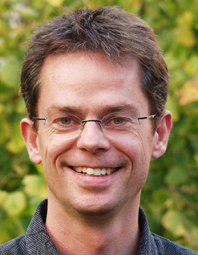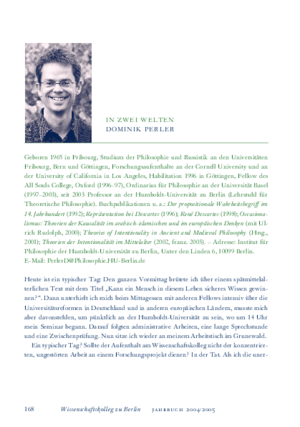
Dominik Perler, Dr. phil.
Professor of Theoretical Philosophy
Humboldt-Universität zu Berlin
Geboren 1965 in Fribourg, Schweiz
Studium der Philosophie und Russistik an den Universitäten Fribourg und Göttingen und an der Cornell University
Project
Varieties of Doubt: Skepticism in Later Medieval and Early Modern Philosophy
Philosophische Debatten im Spätmittelalter und in der frühen Neuzeit (ca. 1300-1700) kreisten um eine Reihe von skeptischen Fragen: Können wir die Dinge in der Welt so erkennen, wie sie wirklich sind? Können wir ihre Eigenschaften und kausalen Verknüpfungen bestimmen? Haben wir überhaupt einen Zugang zu Dingen außerhalb unseres eigenen Geistes? Während meines Forschungsjahres möchte ich anhand ausgewählter Beispiele untersuchen, wie diese Fragen im historischen Kontext gestellt wurden, welche Strategien zu ihrer Beantwortung entwickelt wurden und wie sie die Entstehung moderner Erkenntnistheorien prägten. Drei Ziele stehen dabei im Vordergrund. Erstens sollen bislang vernachlässigte Quellen zum Skeptizismus (u. a. von William Crathorn, Nikolaus von Autrecourt, Francisco Sanches) erschlossen und kommentiert werden. Zweitens sollen die verschiedenen skeptischen und anti-skeptischen Strategien rekonstruiert und miteinander verglichen werden. Drittens soll untersucht werden, welche Rolle diese Strategien für die Erklärung von Wissen spielten. Besonderer Wert wird dabei auf eine epochenübergreifende Auswertung der "scholastischen" und "modernen" Texte gelegt. Dadurch soll auch die grundsätzliche Frage nach den Kontinuitäten und Diskontinuitäten zwischen Mittelalter und früher Neuzeit für einen ausgewählten Bereich neu gestellt werden.Lektüreempfehlung
Perler, Dominik. Repräsentation bei Descartes. Frankfurt/Main: Klostermann, 1996.
Perler, Dominik und Ulrich Rudolph. Occasionalismus. Theorien der Kausalität im arabisch-islamischen und im europäischen Denken. Göttingen: Vandenhoeck und Ruprecht, 2000.
Perler, Dominik. Theorien der Intentionalität im Mittelalter. Frankfurt/Main: Klostermann, 2002.
Colloquium, 25.01.2005
Radical Doubts. The Emergence of Scepticism in Medieval Philosophy
In our daily life we take it for granted that there are many things we simply know. Thus, I know that I am now at the Wissenschaftskolleg and that I will present my research project to my co-fellows. But do I know with certainty that the Wissenschaftskolleg and my co-fellows really exist? Could it not be that a scientist is manipulating my brain right now and making me think about many things, including the Wissenschaftskolleg and other human beings, although none of them exist? Could it not be that all the things I pretend to know are just the content of a sweet illusion?
Since the time of Descartes, who introduced the hypothesis of a deceiving "malicious demon" into philosophical debates, skepticism has become one of the central problems of epistemology. It seems insufficient to explain how we acquire knowledge of many things. We first need to refute radical skeptical hypotheses, thus showing that we can have knowledge at all. But why has skepticism become a serious problem? And why do many philosophers conceive of knowledge as a relation between an "inner" world of thoughts and an "outer" world of material objects - a relation that can always be manipulated by a powerful creature?
In my presentation I intend to show that this type of skepticism is not a "natural" philosophical problem that inevitably arises in every context. It is rather the outcome of a certain epistemological theory that opens a radical gap between an inner and an outer world. This gap is not to be found in ancient skepticism. Nor is it just the invention of Descartes and other early modern philosophers. A number of transformations in late medieval philosophy and theology led to the creation of this gap. In particular, two theoretical shifts were responsible for the emergence of radical doubts: (a) a shift from a model that takes the human mind to be a cognitive faculty "assimilating" objects in the world and becoming somehow identical to them, to a model that conceives of it as the place of inner representations, (b) a shift from a theory that takes God to be the last guarantee for successful cognition, to a theory that presents him as an absolutely free and omnipotent being, unlimited in his power and able to intervene in every cognitive process.
My analysis of these shifts has two goals. First, I intend to show that we need to look at a number of late medieval Aristotelians (Thomas Aquinas, William Ockham, Peter John Olivi, William Crathorn, and others), if we want to understand the emergence of skepticism. We cannot explain it by simply referring to the reception of ancient sources, as some scholars thought, or by characterizing it as a purely modern phenomenon. It is rather to be located within the context of late scholastic debates. It was in fact a critical analysis of Aristotelian theories of cognition that led some philosophers to work out anti-Aristotelian skepticism. Second, I would like to point out that we cannot understand skepticism unless we pay attention to the underlying theory of mind. If we want to avoid this problem, we need to critically examine the opposition between inner and outer world, an opposition that is not naturally given, but that was created within a certain theoretical framework.
Publications from the Fellow Library
Perler, Dominik (2011)
Robert Fludd: die Welt im Kopf
Perler, Dominik (2011)
Perler, Dominik (Frankfurt am Main, 2002)
Theorien der Intentionalität im Mittelalter Philosophische Abhandlungen ; 82
Perler, Dominik (1994)
Philosophische Werke ; 2 ; Abhandlung über das Wasser und die Erde : lateinisch - deutsch Philosophische Werke ; 2.
